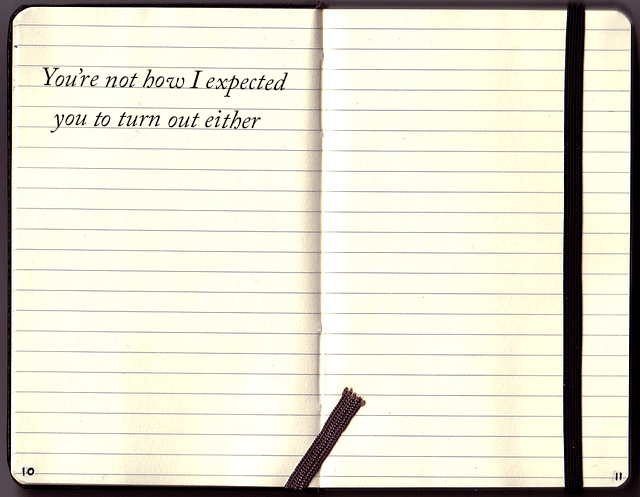A reoccurring key concept reappeared again during last week’s lectures: that creative work is a conversation between yourself and whatever it is you’re creating.
Very few of us can hear something or visualize something in our heads and have it materialize in the real world. When you pluck a guitar string the string reacts. There is no way to know precisely how the sting will sound. You should know what note your hitting of course, but there will be slight nuances beyond your control. When you ink a piece of paper, the paper and pen will react in unique ways too. In short, nothing happens in isolation. Everything created contains some element of conversation. Even writing a paper is a conversation between you and the paper you are writing. By opening yourself up to this conversation, and allowing the dialogue to flow, you can become more creatively productive. Make a conscious effort to keep the lines of communication open especially during the early stages of creating and be open to change.
Bob Ross was the absolute master of this. For one thing, the guy made his living literally having conversations with the canvas. And in addition to being a supreme bad ass, no seriously he was a retired Master Sergeant for the U.S. Air Force, he dropped creative wisdom on the reg. Perhaps his most famous line, “We don’t make mistakes, just happy little accidents.” sums this post up interestingly. Roll with the punches is another way to say it.
The canvas, your event, your paper or a multitude of other creative endeavors may not turn out exactly how you pictured it. It would seem that ‘it’ has a say in things too. But by opening yourself up to the conversation and letting the dialogue flow, your project will begin to speak for itself. You must allow it to be its own thing, and, in a sense, get out of its way. You are not ‘making’ things by yourself. It will be a two-way street.

This reminds me of Roland Barthes essay “Death of the Author”. In that essay he explains how with creative work is only owned by the author of that work up until they share it with someone. Each individual that views creative work with have a different way of viewing it because it is subjective. Creativity is definitely in the eyes of the beholder. But with all that said, when you are doing work for others, the creativity should reflect what they are looking for. I guess in that way, creativity can be sold and restricted to what others are thinking. I think using ones creativity for others helps expand the mind of the original author because others ask or think of things in their own way and to be able to match those expectations is challenging but also leaves you feeling accomplished in a different way.